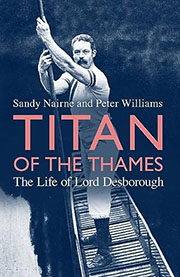A guest post by London Historians member Joanna Oyediran
Titan of the Thames: The Life of Lord Desborough by Sandy Nairne and Peter Williams

Version 1.0.0
Despite organising Britain’s first Olympics and being an energetic public servant, William Grenfell (1855-1945) has “gone missing from British history”. This biography seeks to reinstate him.
Grenfell, raised to the peerage as Lord Desborough in 1905, first became famous as an outstanding sporting all-rounder. His athletic achievements included swimming twice across the basin of Niagara Falls, rowing for Oxford in two Boat Races, and winning a silver medal in his fifties for Great Britain in epée at the 1906 Intercalcalated Games. During his life he also played or was associated with athletics, bartitsu, boxing, bowls, cricket, croquet, coaching, fishing, game hunting, golf, harriers and drag hounds, mountaineering, racing punting, stické, lawn tennis, and wrestling. Equally importantly, Lord Desborough was an impassioned advocate for the physical and moral benefits of sport. He frankly admitted his preference for amateur over professional sports, based on his desire to widen public participation. Grenfell was also involved in founding many sporting institutions, including London’s Queen’s Club as the home of racquet sports.

Sandy Nairne and Peter Williams dedicate two chapters to Lord Desborough’s pivotal role, as first Chairman of the British Olympic Association (BOA), in organising the 1908 Olympics in London. They take us back to a time when the games, only revived in 1896, were organised by an incipient cash-strapped movement rather than the behemoth of today.
The BOA agreed to host the Olympics at short notice in 1906, after it became clear that Italy, hit by the recent eruption of Mount Vesuvius, could not organise the games in Rome. Lord Desborough leveraged his connections to raise funds and persuade Britain’s different sporting associations to rally behind the project. He pioneered what were to become Olympic tenets at the 1908 games – such as national Olympic teams and internationally-agreed rules for each sporting competition.
But it was Lord Desborough’s deal with Imre Kiralfy, the organiser of the Franco-British Exhibition of 1908, which made the London games viable (the British government had refused financial support). The exhibition organisers undertook to build a stadium and track at their own cost to the specification of the British Olympics Committee, charged with organising the games, in return for a proportion of the ticket revenue. This was the first time a stadium was purpose-built for the Olympics. Constructed in 10 months, it was the largest stadium in the world at the time. It contained modern facilities such as a “swimming tank”, together with running and cycling tracks. Ironically, the Olympic stadium ended up as the home of dog racing after the Greyhound Racing Association bought the lease in 1926. It’s doubtful that Lord Desborough approved.

White City Stadium
William Grenfell was born at Taplow Court, on the banks of the Thames near Maidenhead. The river was central to him throughout his life, first as a user and later also as an administrator. The authors accompany Lord Desborough through a period of transition on the Thames as it became less a means of transport with associated trades and more a space for sport and leisure upstream and a major artery for commerce and trade downstream.
Grenfell served on the board of the Thames Conservancy, acting as chairman from 1905 until 1937 when he was in eighties. Three years into Lord Desborough’s chairmanship, the government reduced the conservancy’s powers and transferred responsibility for managing the tidal Thames to the newly established Port of London Authority. However, the conservancy retained significant responsibilities for taking care of over 140 miles of river between Teddington and its source. Desborough devoted significant energy to the complex work of the under-resourced conservancy which had to manage the river while managing many different interests, including local government, landowners, water boards and drainage boards. Lord Desborough oversaw the Thames Improvement Scheme, a huge project, executed in the 1930s to avoid flooding by increasing the waterflow between Teddington and Walton-on-Thames. His deep understanding of the river made him a very early advocate for the creation of a “Thames Barrage” to reduce the threat of flooding to London. In 1928 floods caused part of the Thames Embankment to collapse and led to the loss of 14 lives and extensive property damage, including the lower ground floor and basement of the Tate Gallery. He commented: “The only way I can see is the one that was suggested, and that I recommended 21 years ago. That is, to put a barrage from Tilbury to Gravesend with locks in it.”
The authors have made a convincing case that William Grenfell deserves to be better remembered for his contribution to public life over many decades, especially the advancement of sport in London, the U.K. and globally. Lord Desborough helped to cement the fledgling Olympic movement by successfully organising the games in London in 1908 and establishing some of the Games’ traditions which we today take for granted.
__________________________________________________
Titan of the Thames: The Life of Lord Desborough (384pp) by Sandy Nairne and Peter Williams is published by Unbound with a cover price of £25.